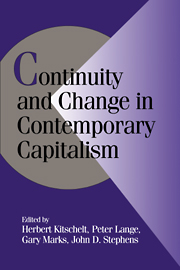Book contents
- Frontmatter
- Contents
- List of Contributors
- Preface
- Introduction
- PART I THE INTERNATIONAL SETTING FOR POLITICAL-ECONOMIC STRATEGIES
- PART II THE DYNAMICS OF DOMESTIC POLITICAL ECONOMIES
- 4 Divergent Production Regimes: Coordinated and Uncoordinated Market Economies in the 1980s and 1990s
- 5 The Political Economy of Europe in an Era of Interdependence
- 6 The Welfare State in Hard Times
- 7 Postwar Trade-Union Organization and Industrial Relations in Twelve Countries
- 8 Social Democratic Labor Market Institutions: A Retrospective Analysis
- 9 The Declining Significance of Male Workers: Trade-Union Responses to Changing Labor Markets
- PART III POLITICAL ECONOMY AND DEMOCRATIC COMPETITION
- PART IV CONCLUSION
- References
- Index
- Title in the series
5 - The Political Economy of Europe in an Era of Interdependence
Published online by Cambridge University Press: 05 June 2012
- Frontmatter
- Contents
- List of Contributors
- Preface
- Introduction
- PART I THE INTERNATIONAL SETTING FOR POLITICAL-ECONOMIC STRATEGIES
- PART II THE DYNAMICS OF DOMESTIC POLITICAL ECONOMIES
- 4 Divergent Production Regimes: Coordinated and Uncoordinated Market Economies in the 1980s and 1990s
- 5 The Political Economy of Europe in an Era of Interdependence
- 6 The Welfare State in Hard Times
- 7 Postwar Trade-Union Organization and Industrial Relations in Twelve Countries
- 8 Social Democratic Labor Market Institutions: A Retrospective Analysis
- 9 The Declining Significance of Male Workers: Trade-Union Responses to Changing Labor Markets
- PART III POLITICAL ECONOMY AND DEMOCRATIC COMPETITION
- PART IV CONCLUSION
- References
- Index
- Title in the series
Summary
The study of comparative political economy is at a crossroads. The conceptual foundations for the field were laid during the late 1960s and early 1970s just as the “golden age” of postwar capitalism was peaking. However, the industrialized economies have experienced dramatic changes during the past two decades. Are the concepts on which we have long relied still adequate for organizing our understanding of the political economy? How might they be extended or revised to explain economic and political developments today?
The object of this chapter is to provide some tentative answers to these questions with special reference to western Europe. In the first section, I identify the conceptual approaches represented in the “first” and “second” waves of work that laid the groundwork for the field. Building on the insights of this literature, I then attempt to develop a conceptual framework for analyzing the changes taking place in contemporary political economies. In the third section, I use this framework to identify the most central developments in the political economies of Europe during the 1980s and 1990s. Finally, I explore how we might use such a framework to understand the adjustment paths that firms and nations are now following.
In general, the field of comparative political economy concentrates on two central issues: how to explain patterns of economic performance and policy across nations. To such questions, economics has long supplied a variety of answers that figure with growing prominence in the literature of political economy.
- Type
- Chapter
- Information
- Continuity and Change in Contemporary Capitalism , pp. 135 - 163Publisher: Cambridge University PressPrint publication year: 1999
- 46
- Cited by

